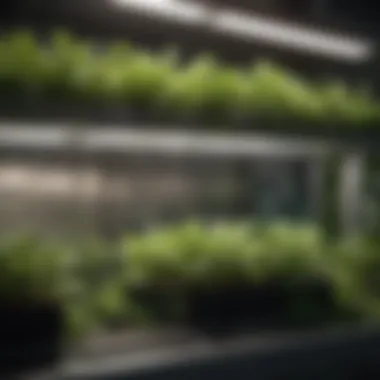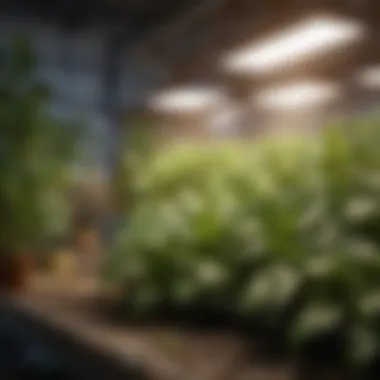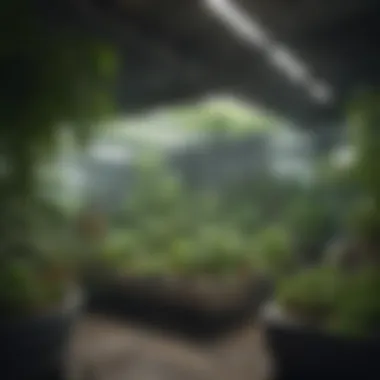Exploring Hydroponics Stores: A Complete Guide


Intro
The growing interest in hydroponics reflects a significant shift in agricultural practices. By eliminating the need for soil, this method allows for a more controlled growing environment. In doing so, hydroponics addresses key challenges in modern agriculture, such as land scarcity and resource management. This guide aims to provide insights into general hydroponics stores, their relevance, and the opportunities they present for both gardeners and those interested in sustainable practices.
Current Trends in Agriculture and Horticulture
Overview of Recent Innovations
The agriculture sector is in the midst of rapid transformation, largely driven by the need for efficient and resource-conscious methods. Hydroponics has emerged as a frontrunner in innovative agricultural technology. With advancements such as nutrient film technique and aeroponics, growers can achieve higher yields in less time. These methods reduce the amount of water and nutrients used compared to traditional farming.
Sustainable Practices Gaining Popularity
Sustainability is at the core of hydroponics. Many urban farmers and enterprises are adopting these systems to cultivate food in limited spaces. As awareness of food sourcing increases, consumers are seeking locally grown, sustainable options. Hydroponics offers a viable solution here, ensuring fresh produce year-round with minimal environmental impact. The combination of technology and ecology promotes a new perspective on food production, benefiting both farmers and consumers alike.
Essential Farming Techniques
Soil Health Management
While hydroponics operates without soil, understanding soil health remains essential. Conventional farming teaches important lessons about nutrient balance, pest control, and crop rotation. Hydroponic systems mimic these principles through nutrient solutions and root zone health. Regular monitoring ensures that plants receive the appropriate nutrients needed for optimal growth.
Pest and Disease Control Strategies
Effective pest management is crucial in hydroponics. Growers must remain vigilant to prevent infestations and diseases since plants are grown in concentrated environments. Integrated Pest Management (IPM) techniques, including biological controls and organic pesticides, can safeguard crops against common threats without harming the ecosystem.
Tools and Technology in Farming
Overview of Advanced Farming Tools
The rise of hydroponics has led to the development of specialized tools and technology designed to enhance efficiency. Key tools include:
- Grow lights: These provide essential wavelengths for photosynthesis in indoor settings.
- Nutrient delivery systems: Automated systems ensure consistent feeding of crops without human error.
- Climate control systems: Maintaining optimal growing conditions is essential for plant health.
Case Studies on the Use of Technology
Various case studies highlight successful hydroponic farms leveraging technology. Consider the example of Gotham Greens, which utilizes advanced greenhouse systems to produce leafy greens in urban areas. Their innovative approach minimizes carbon footprint while maximizing yield, demonstrating how technology can reshape food systems.
"Hydroponic systems not only improve efficiency in production but also contribute significantly to environmental sustainability."
The ability to adapt these practices speaks to the potential for further innovation in the agricultural landscape.
Understanding Hydroponics
Hydroponics represents a significant shift in modern agriculture, moving away from traditional soil-based methods. This concept is essential for those looking to maximize their agricultural endeavors while considering sustainability and efficiency. Understanding hydroponics allows farmers and enthusiasts to explore a method that is not only innovative but also potentially transformative for urban agriculture.
Definition of Hydroponics
Hydroponics is a method of growing plants without using soil. Instead, plants grow in nutrient-rich water solutions, which provide all the essential minerals directly to the roots. This method can lead to faster growth and higher yields compared to traditional gardening. Various hydroponic systems exist, including nutrient film technique (NFT), deep water culture (DWC), and aeroponics, each offering unique benefits based on the gardener's needs and the types of plants being cultivated.
Using hydroponics, one can control the environment more efficiently. Factors like pH levels, nutrient concentrations, and temperature can be carefully managed. This leads to optimal growth conditions that are especially beneficial in areas with poor soil quality or limited agricultural space. In essence, hydroponics provides more than just a soil-less gardening solution; it offers a practical way to grow food in space-constrained environments.
History and Development
The history of hydroponics is rich and varied. The roots of this technique can be traced back to ancient civilizations. The Hanging Gardens of Babylon, for instance, showcase an early form of soil-less gardening, believed to use similar principles. However, modern hydroponics began gaining traction in the 20th century.
In the 1930s, scientists like Dr. William Frederick Gericke started experimenting with growing plants in mineral nutrient solutions, leading to the development of what is considered the first modern hydroponic system. Subsequently, during World War II, hydroponics was employed to grow food in limited space, demonstrating its utility in crisis situations.


Since then, the field has progressed considerably. Advances in technology have led to refined nutrient solutions, improved lighting systems, and efficient hydroponic setups. As urbanization continues to rise, hydroponics is positioned as a crucial method for enhancing food production in cities. The evolution of this method underscores its adaptability and relevance in contemporary agriculture.
"Hydroponics allows for sustainable food production in spaces where traditional farming is unfeasible."
Understanding hydroponics is not just about recognizing how plants grow without soil; it is about appreciating its potential to address modern agricultural challenges. This awareness is foundational for anyone considering or currently involved in hydroponic gardening.
The Importance of Hydroponics
Hydroponics offers significant advantages that resonate deeply with the needs of modern agriculture. As the global population increases, food production methods must adapt. The relevance of hydroponics extends beyond simple plant growth; it encompasses resource management, urban farming opportunities, and contributions to sustainability. By understanding these areas, stakeholders in agriculture can harness the potential of hydroponics to address pressing challenges.
Resource Efficiency
One of the primary drivers for adopting hydroponics is resource efficiency. Traditional farming requires vast amounts of water and land. However, hydroponics can drastically reduce both. For instance, hydroponic systems can use up to 90% less water than conventional soil-based farming. This advantage allows for water conservation, an essential factor especially in drought-prone areas.
Additionally, hydroponics provides the ability to grow crops in limited spaces, such as urban areas or places with poor soil quality. This method utilizes vertical farming, meaning crops can be grown in stacked layers, optimizing space usage significantly. This efficiency supports the idea of growing food close to urban centers, reducing transportation costs and time.
Urban Agriculture Potential
Urban agriculture is increasingly recognized as a vital element of food production. Hydroponics plays a crucial role in this trend. With cities expanding rapidly, finding arable land for farming becomes problematic. Hydroponics allows individuals and communities to cultivate fresh produce in small spaces, such as balconies or rooftops. This innovation not only provides greater access to food but also encourages local economies.
In urban environments, hydroponic systems can be established in schools, community centers, and restaurants. Engaging the community in food production promotes education about the food system. Moreover, it creates a connection between consumers and their food sources, fostering a sense of accountability towards sustainable practices.
Sustainability Benefits
Sustainability is at the forefront of global agricultural discourse. Hydroponics addresses several sustainability issues that are increasingly critical today. The method minimizes chemical runoff, as water is recirculated in a closed system. This approach lessens the harmful environmental impacts associated with traditional agriculture, such as soil degradation and pesticide use.
Furthermore, hydroponics promotes the growth of a diverse range of crops year-round. By effectively controlling the growing environment, growers can cultivate plants irrespective of external seasonal changes. This capability contributes to food security, as it mitigates risks associated with climatic variations.
Finding General Hydroponics Stores
Finding general hydroponics stores is a significant step for anyone interested in hydroponics gardening or farming. These stores are specifically tailored to meet the needs of hydroponic systems, which can greatly enhance the efficiency and effectiveness of growing plants without soil. When searching for these stores, it's crucial to employ various methods to ensure a comprehensive selection of resources, products, and expertise.
Using Online Resources
The internet serves as a valuable tool for anyone looking to find general hydroponics stores. Multiple online platforms provide extensive listings and reviews of stores. Websites such as Yelp or Google Maps can help locate store addresses, hours of operation, and customer feedback. Equally, specialized forums on platforms like Reddit can offer insights on the best stores based on user experiences. Online resources save time and help to identify stores that may carry specific brands or unique products. Moreover, many stores have shifted to e-commerce, allowing for convenient online shopping and access to products that might not be available locally.
Local Directories and Listings
Using local directories and listings is another effective way to uncover general hydroponics stores. Many cities have business directories, both online and in print formats. Not only can you find store names and addresses, but these directories often include special details such as the types of products offered or the level of expertise available. Local agriculture extension offices may also provide guidance on where to find hydroponics resources. The advantage is that directories can showcase businesses that are lesser-known but valuable. By exploring these listings, enthusiasts can find hidden gems, support small businesses, and gain insight into the local hydroponics community.
Community Recommendations
Community recommendations play a critical role in finding general hydroponics stores. Engaging with local gardening groups can lead to valuable discussions and tips. Forums, social media groups, and clubs focused on hydroponics often share experiences about their favorite suppliers. Word-of-mouth recommendations from fellow enthusiasts can help identify reliable sources and local experts who can answer questions and guide purchases. By participating in community events, workshops, or meet-ups, individuals can network with others who share similar interests. This collective knowledge can direct you to stores that offer not only products but also a strong sense of community involvement and support.
"Supporting local hydroponics stores strengthens community ties and fosters a vibrant gardening culture."
In summary, finding general hydroponics stores involves leveraging various resources. From utilizing online tools to exploring local listings and seeking community insights, each method contributes to a richer understanding of available options. This effort is essential for any hydroponics enthusiast seeking to enhance their knowledge and gardening capabilities.
What to Expect in Hydroponics Stores
Visiting a hydroponics store can be a transformative experience for amateur and seasoned growers alike. These stores offer not just products but also insights into hydroponic practices. A clear understanding of what to expect can enhance the experience and help you make informed choices. Knowing the types of products and services available can lead to better outcomes in your hydroponic endeavors.
Product Range Overview
When exploring a hydroponics store, one can encounter a rich variety of products designed to support the hydroponic growing process.
Nutrients and Supplements


Nutrients and supplements are essential for the health of hydroponically grown plants. Many products contain a blend of macronutrients and micronutrients, which are crucial for plant growth. Typically, these nutrients provide everything a plant needs to thrive in a soil-less environment. The key characteristic of these products is their formulation, tailored specifically for hydroponic systems. A popular choice among growers is the General Hydroponics Flora Series, which allows for customized feeding schedules. The unique feature of nutrient solutions is their ability to easily dissolve in water, ensuring that plants can absorb what they need quickly. While they can be expensive, the benefits they offer in promoting healthy and vigorous plant growth often outweigh the costs.
Growing Equipment
Growing equipment includes systems and tools needed for setting up a hydroponic garden. This equipment belongs to diverse categories like deep water culture and nutrient film technique systems. One notable choice is the EcoPlus Hydroponic System, which includes everything necessary for beginners. These systems are popular for their ease of use and adaptability to various settings. A distinct advantage is that they allow for scalable gardening, catering from small indoor setups to larger, extensive operations. However, the initial investment can be significant, and if not set up correctly, it might lead to plant failures.
Lighting Solutions
Lighting is another critical aspect of hydroponics, especially when growing indoors. Proper lighting solutions, like LED grow lights, can significantly influence crop yields. The key attribute of these lights is their energy efficiency and spectrum control, which mimic the natural sunlight needed for photosynthesis. LED lights offer a unique feature of having adjustable brightness and spectrum settings suitable for different plants at various growth stages. While they have a higher upfront cost, their longevity and energy savings make them a beneficial investment for many growers.
Services Offered
In addition to product offerings, hydroponics stores often provide valuable services that can enhance the experience for growers.
Consultation and Advice
Consultation and advice services are pivotal for both new and experienced growers. Store staff typically possess deep knowledge about various hydroponic systems and can offer tailored advice based on individual needs. This service is recognized for its importance in guiding customers through the often overwhelming process of setting up and maintaining a hydroponic system. The unique advantage is that personalized advice can lead to more successful gardening outcomes. However, the effectiveness of this service can vary depending on the staff's expertise.
Workshops and Training
Workshops and training sessions provide practical, hands-on learning experiences. Such programs can clarify the complexities of hydroponics and educate participants about best practices. The key characteristic of these workshops is the interaction with knowledgeable instructors, who can demonstrate techniques and answer questions in real time. These training opportunities boost confidence for those entering the hydroponics field. One downside is that not all stores may offer frequent workshops, limiting accessibility for some.
Delivery Options
Delivery options are increasingly common in hydroponics stores, addressing the needs of busy customers. Many stores now offer delivery services for the products purchased, which can simplify the logistics of setting up a hydroponic garden. This service is beneficial as it provides convenience and facilitates access to bulk purchases. The unique feature of delivery options is the accessibility of rare or specialty items that might not be readily available in local outlets. However, one must consider potential additional fees or delays in delivery time which might occasionally occur.
Benefits of Shopping at Local Hydroponics Stores
Shopping at local hydroponics stores presents a range of advantages that can significantly benefit both new and experienced growers. Understanding these benefits is crucial for anyone interested in adopting hydroponic systems. The accessibility of specialized products and expert knowledge makes local stores indispensable for a thriving hydroponic garden.
Expert Guidance
One of the primary advantages of shopping at local hydroponics stores is the access to expert guidance. Employees in these stores often have in-depth knowledge and experience in hydroponics. They can offer tailored advice to customers based on the specific needs of their plants and systems. This personalized assistance can be invaluable, especially for beginners who may feel overwhelmed by the complexity of hydroponic gardening.
Local staff can explain different nutrients and supplements, address issues with plant growth, or suggest appropriate equipment. This direct interaction usually provides quicker and more reliable support than searching for answers online or through general forums.
Community Engagement
Engaging with a local hydroponics store fosters a sense of community among growers. These stores often serve as community hubs where individuals share experiences, challenges, and successes. Participating in this community can lead to networking opportunities and friendships. Local stores may host workshops, events, or even informal gatherins to discuss new trends in hydroponics and share techniques.
More than just a retail space, these stores often offer a platform for personal growth and learning. Connections made here can enhance the overall experience of hydroponic gardening.
Supporting Local Businesses
Shopping at local hydroponics stores contributes to the economy of the community. Local businesses typically reinvest their earnings back into the community. This practice leads to economic growth and job creation. When enthusiasts choose local stores over larger chain retailers, they are also investing in the resilience of their local economy.
Consumers need to consider the impact of their purchasing choices. Supporting local stores helps maintain diverse shopping options and fosters competition among businesses, which can lead to better customer service and products.
"By supporting local businesses, customers not only find unique products but also contribute to their community's sustainability and economic health."
Local hydroponics stores offer a plethora of benefits that extend beyond mere transactions. With expert guidance, community engagement, and the opportunity to support local businesses, enthusiasts can enjoy a more enriching hydroponic gardening experience.
Challenges in Hydroponics
Hydroponics, while offering numerous advantages, also comes with its own set of challenges that cannot be ignored. Understanding these challenges is crucial for anyone considering this method of cultivation. The three major challenges include initial costs, technical knowledge requirements, and ongoing maintenance of systems. Recognizing these factors can help potential growers make informed decisions and anticipate obstacles.


Initial Costs
The first challenge that many encounter is the initial costs associated with setting up a hydroponic system. The expense can be significant, particularly for those new to this approach. Setting up a basic system, which includes components like reservoirs, pumps, growing media, and lighting, can range from a few hundred to several thousand dollars.
When budgeting, consider not just the equipment but also possible costs for nutrients and additional tools. Investing in a more advanced system may lead to better yields, but the upfront financial commitment can be daunting. For beginners, starting small might ease the transition and reduce financial pressure. Over time, as they gain experience and witness the efficiency of hydroponics, they may be more willing to invest further.
Technical Knowledge Requirements
Hydroponics is not solely about growing plants without soil; it also demands a certain level of technical knowledge. This knowledge is crucial for understanding the specific needs of various plants, as well as the intricacies of nutrient solutions, pH levels, and water circulation.
Many successful hydroponic growers often depend on research and experimentation to innovate their techniques. New growers, however, might find this learning process overwhelming. Available resources, such as online forums or local hydroponics shops, can be excellent starting points. Engaging with community forums on platforms like Reddit could offer invaluable insights and practical tips from experienced growers.
Maintenance of Systems
Maintenance is another frequent concern in the world of hydroponics. A hydroponic system requires regular monitoring and management to ensure optimal growth conditions. This includes checking nutrient levels, maintaining water quality, and keeping systems clean. Any lapse in maintenance can lead to a decline in plant health or even system failure.
The need for diligence can be particularly challenging for those with busy schedules. Many growers find that time management and routine checks are essential. Setting reminders can help keep track of maintenance tasks. Additionally, as technology advances, automated systems are becoming available that can alleviate some of the burdens of manual maintenance.
"The key to successful hydroponic gardening lies in understanding the system and regularly monitoring its conditions."
These challenges in hydroponics can be significant hurdles but they are not insurmountable. With careful planning and commitment, growers can turn these challenges into manageable tasks, leading to fruitful and sustainable gardening endeavors.
Future of Hydroponics
The future of hydroponics holds significant promise, shaping how we approach food production and agriculture. This topic is vital in understanding the trends and innovations taking place in the hydroponics industry. As agricultural research and technology evolve, many advancements will have profound effects on sustainability, efficiency, and food security. Hydroponics is not only a method of growing plants; it is a way to reform current agricultural practices, offering solutions for urban environments and resource constraints.
Technological Advancements
Technological progress is a central component in shaping the future of hydroponics. Innovations in equipment and techniques make hydroponic systems more efficient and accessible. For example, automated systems, such as nutrient delivery and environmental control, reduce the need for manual labor. Sensors can monitor plant health and nutrient levels, ensuring optimal growing conditions. Additionally, advancements in LED lighting technology allow for better energy efficiency and improved plant growth rates.
The adoption of data analytics and artificial intelligence can also enhance cultivation practices. Farmers can use data to make informed decisions regarding crop management. These technologies enable growers to minimize waste and maximize yield, contributing to more sustainable practices that benefit both the environment and the economy.
Market Growth
The demand for hydroponic produce continues to rise. As populations grow and urban areas expand, the need for fresh, locally grown food increases. Market analysis suggests that hydroponics will see substantial growth in the upcoming years. This trend is driven by the increasing interest in sustainable farming practices and organic produce. Both consumers and retailers are likely to prioritize hydroponically-grown products.
Furthermore, the rise of urban farming initiatives leads to more businesses pursuing hydroponics as a viable option. The integration of community-based approaches to gardening encourages participation and support for local ventures. As more growers enter the market, the competition stimulates innovation and lowers costs. This can make hydroponic products more affordable and widely accessible.
Impact on Food Security
Hydroponics contributes to food security by providing reliable access to fresh produce. In areas where traditional agriculture may struggle due to climate or soil conditions, hydroponics can offer a solution. The capability to grow food in controlled environments means that crop yields are less dependent on external factors, such as weather and pests.
Moreover, hydroponics can foster food production in urban spaces, where arable land is limited. Vertical farming techniques, which are part of the hydroponic approach, utilize space efficiently and can produce a significant amount of food in small areas. This method of farming not only supports local food systems but also decreases the carbon footprint associated with transportation.
"Hydroponics represents a paradigm shift in how we can sustainably feed our growing population while preserving natural resources."
End
In this article, we have explored various facets of general hydroponics stores and their relevance to both enthusiasts and professionals in the field of agriculture. The importance of understanding hydroponics and the avenues for acquiring suitable products cannot be overstated. As urban populations grow and resources become scarce, hydroponics offers innovative solutions that can be integrated into our daily lives. Seeking knowledge and products from hydroponics stores extends beyond mere shopping; it fosters a community of informed individuals dedicated to sustainable practices.
Summary of Key Points
The journey through this guide highlighted several essential topics:
- Understanding Hydroponics: A clear definition and its historical context provided the foundation for appreciating the importance of this cultivation method.
- Importance of Hydroponics: Hydroponics offers remarkable resource efficiency, urban agriculture potential, and sustainability, which are crucial in today's context.
- Finding Stores: Utilizing online resources, community recommendations, and local directories can simplify the process of locating suitable hydroponics outlets.
- Store Offerings: A summary of product ranges including nutrients, growing equipment, and lighting solutions informs potential buyers.
- Shopping Benefits: Local stores offer expert guidance, enhance community engagement, and allow one to support small businesses.
- Challenges in Hydroponics: Acknowledging the barriers such as initial costs and technical knowledge requirements prepares buyers for practical engagement.
- Future Insights: Technological advancements and market growth related to hydroponics suggest a promising future for food security and sustainable practices.
Encouragement for Further Exploration
As you reflect on the information discussed, consider the vast opportunities that lie within hydroponics. Engaging with local hydroponics stores not only serves the purpose of purchasing but also empowers you with valuable insights and knowledge that can enhance your gardening skills. I strongly recommend attending workshops or training sessions that these stores often provide. Emphasize building connections within your community, and do not hesitate to reach out for advice or shared experiences among fellow hydroponics enthusiasts.
Furthermore, actively participating in discussions on platforms like Reddit, or following updates on Facebook, could amplify your understanding and enjoyment of hydroponics. The exploration of this topic is ongoing; your journey does not stop with this article. Embrace the learning curve and contribute to the sustainable future we collectively seek.
"The only way to do great work is to love what you do." - Steve Jobs



